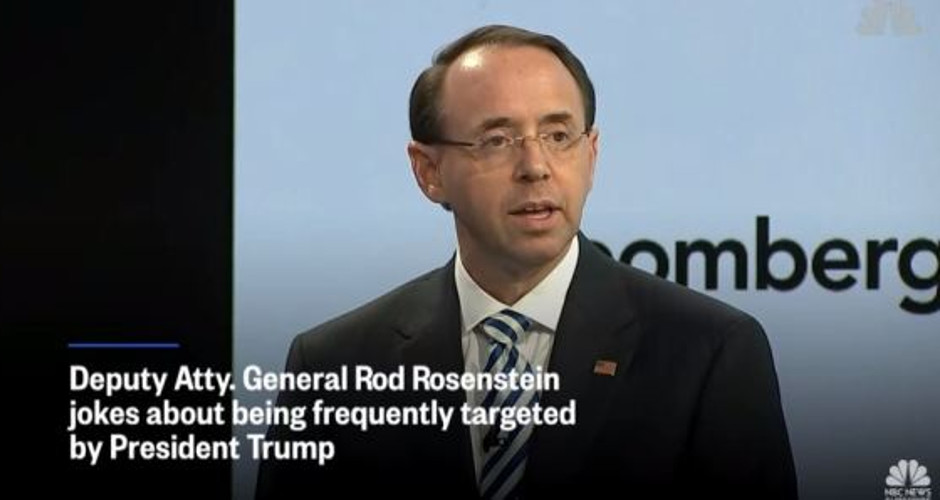— Published with Permission of ConservativeHQ.com —
Rumors are swirling around Washington DC that Deputy Attorney General Rod Rosenstein is out in the wake of last week’s New York Times bombshell report that in the spring of 2017, shortly after President Trump fired former FBI director James Comey, Rosenstein discussed the idea of secretly recording a conversation with President Donald Trump.
The Deputy AG also had a conversation about invoking the 25th Amendment to remove Trump from office, the New York Times’ report claims.
Rosenstein has twice denied the report, but former FBI attorney Lisa Page, who was at the meeting confirmed that Rosenstein did in fact make the remarks and that he wasn’t being sarcastic, as he has claimed.
But whether Rosenstein resigned as news site Axios reported early today or is about to be fired remains to be confirmed, and that is a key factor in what happens next.
As Erin Dunne, writing for the Washington Examiner explained, the Federal Vacancies Reform Act of 1998 stipulates if a vacancy at a federal agency occurs because the official “dies, resigns, or is otherwise unable to perform the functions and duties of the office holder” then the president has broad authority over who the acting replacement will be.
That’s all well and good if it turns out that Rosenstein did, in fact, resign, says Dunne. Then Trump is free to pick a new acting deputy AG. That person would supervise the investigation by special counsel Robert Mueller into Russian meddling in the 2016 election and related matters.
Here’s the issue, notes Dunne: The vacancy law’s provision on appointment of acting officials, does not include the word “fired.” So, can the president appoint an acting official to replace a fired official?
There’s no court precedent on this. So, maybe? Maybe not?
If Rosenstein is fired, this could all end up in the courts, further delaying the end of the Russia investigation and bedeviling President Trump with another unneeded controversy.
But what if Rosenstein does resign, or is fired, who would Trump appoint in this place?
Theoretically, the President could appoint any other Senate-confirmed member of his administration to serve as Acting Deputy Attorney General, as he did when he appointed OMB Director Mick Mulvaney to run the Bureau of Consumer Financial Protection as Acting Director.
Of the many options that presents the President, several would stand out as positive developments from the conservative perspective.
The New York Times reports that Solicitor General Noel Francisco will oversee the Russia probe and Matthew Whitaker, chief of staff to Attorney General Jeff Sessions, will take over as acting Deputy Attorney General.
We doubt the veracity of this report, although both are reported to be solid conservatives, Solicitor General Francisco was with the law firm of Jones Day, which served as outside counsel to the Trump campaign, raising a potential conflict of interest.
Absent a favorable call from the Ethics Counsel’s office, were Francisco to become Acting Deputy Attorney General it could create the same problem of recusal that has hindered Attorney General Jeff Sessions’ ability to manage the Mueller investigation.
A better scenario would be for the President to appoint one of the solid conservative U.S. Attorneys to serve as Acting Deputy Attorney General.
Under the Vacancies Act, an Acting Deputy Attorney General could act for 210 days, and more if the President were to nominate a replacement during that time. The bad news is that the Acting cannot be nominated to fill the vacancy for which he or she is Acting, so once a replacement is confirmed, the Acting Deputy Attorney General would return to his or her former position.
We agree with the President that there is a “lingering stench” at the Justice Department and FBI, however, it is unclear whether Rosenstein will resign, be fired or stay in his position.
Fox News host Sean Hannity urged President Trump on Friday night not to fire Deputy Attorney General Rod Rosenstein amid a report that he wanted to rally Cabinet members to invoke the 25th Amendment to the Constitution to oust the president.
Hannity pleaded with Trump via his show to not fire anyone in response to the report, which Rosenstein has denied, claiming that it was a “setup.”
“Under no circumstances — I have a message for the president tonight — under zero circumstances should the president fire anybody,” Hannity said.
“The president needs to know it is all a setup,” he continued, saying the so-called deep state is “turning against each other.”
On the other hand, our friends Laura Ingraham and Judge Jeanne Piro both urged the President to fire Rosenstein when news of Rosenstein’s comments about wearing a wire and invoking the 25th Amendment to remove Trump first broke.
Please leave your take on what the President should do in the comments below so that we can share them with other CHQ readers.


